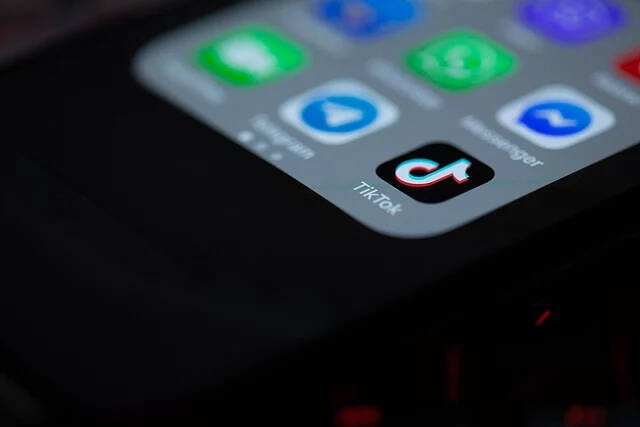For us, and much of Gen Z, TikTok is essential to our daily routine. We wake up, scroll on TikTok; brush our teeth, scroll on TikTok. The wildly popular social media platform punctuates our day as respites between classes, work, internships—all the responsibilities of college students.
The platform launched in 2016 and describes itself as “the world’s leading destination for short-form mobile videos.” It is used by hundreds of millions of people for a wide variety of creative purposes. Need a tutorial, review, tip or opinion on seemingly any topic in the world? Chances are TikTok creators have anywhere from a 30-second to 10-minute video on it.
TikTok is known for its extremely specific and reactive algorithm, which gathers user data to offer tailored suggestions for viewing more, similar videos on the user’s For You Page. But the usage of this data by ByteDance, TikTok’s parent company based in China, has prompted privacy concerns within the U.S. government.
On April 24, President Biden signed a law that will effectively ban TikTok for U.S. users unless ByteDance agrees to sell TikTok altogether within 270 days. (Mr. Biden has the option to extend that deadline by 90 days.) The possible ban on the app in the United States has prompted discussions among politicians and parents alike about the value of the app more generally.
TikTok’s algorithm caters to user preferences, creating an addictive scrolling experience, and can lead to cycles of content consumption in echo chambers that are breeding grounds for misinformation. But for avid TikTok users like us, the idea of losing access to the app is incredibly distressing.
Our experience may be colored by the fact that we, like so many users, downloaded the app in 2020, at the start of the pandemic lockdown. When almost all forms of in-person engagement were shut down, TikTok provided a way to connect to a larger community while staying up-to-date on trends, pop culture and the state of the world. As society has mostly returned from the virtual world, TikTok has remained a point of reference for real-life socialization. We often search for content about things to do in our cities and neighborhoods, books to read, shows to watch, recipes to try and pop culture moments. In turn, our feed floods with content that will keep us watching longer.
TikTok content can also transcend borders on a global scale. The app promotes the formation of communities among people who would never have met without the internet. It also allows users to explore and educate themselves on any topic with the anonymity that the digital world can offer.
It can even hold value for faith-based communities. Plenty of creators are dedicated to praising Jesus and sharing the best ways to live out one’s faith. Subcategories of content like Lent-tok and Ramadan-tok can provide virtual spiritual guidance, tips for daily prayer and relatable videos about accidental slip-ups in religious practice.
If these online “families,” as they are sometimes referred to by users, are dispersed, young people will still seek other online platforms when they crave a sense of belonging. The problem is not that TikTok users feel disappointed about the potential loss of an entertaining social platform; it is that many young people see a ban on TikTok as the end of, or at least a major disruption to, their social life.
Granted, the potential ban is a good reminder that there is still an opportunity for in-person communities to return as a central part of young people’s lives. As much as we love TikTok, online communities are far from perfect, and they can’t be our only source of connection. Online spaces can lend themselves to cyberbullying, thanks to the cloak of anonymity. And no matter how well-tailored they are, these endless streams of content can easily become a waste of time. We are not ignorant of the downsides of TikTok, and sometimes feel the need to take time away from the platform.
The process of finding an in-person community that meets specific needs will depend on what each individual is searching for. Brigid has found community through weekly attendance at student meetings hosted by the international Catholic movement Communion and Liberation. It’s a challenge to subway from Columbia University to the N.Y.U. Catholic Center every Thursday evening, but the regular meetings and the group’s open-minded attitude foster worthwhile reflections on faith and life.
In-person connection for Laura consisted of visiting different churches and religious sites while studying abroad in Europe last semester. The excursions included a mosque in London, several cathedrals in Paris and a Latin Mass in Edinburgh. While showing up to unfamiliar sacred spaces can seem daunting, it has always resulted in fruitful cultural exchanges, new understandings of faith and local recommendations. This has inspired a continued mission to visit more worship sites in New York City.
If a TikTok ban does take effect, we will mourn its loss alongside the rest of the “Gen Z internet.” We are taking the moment as a reminder to invest more in relationships beyond screens and to prioritize in-person connection—including the heightened authenticity and vulnerability that comes with it.








